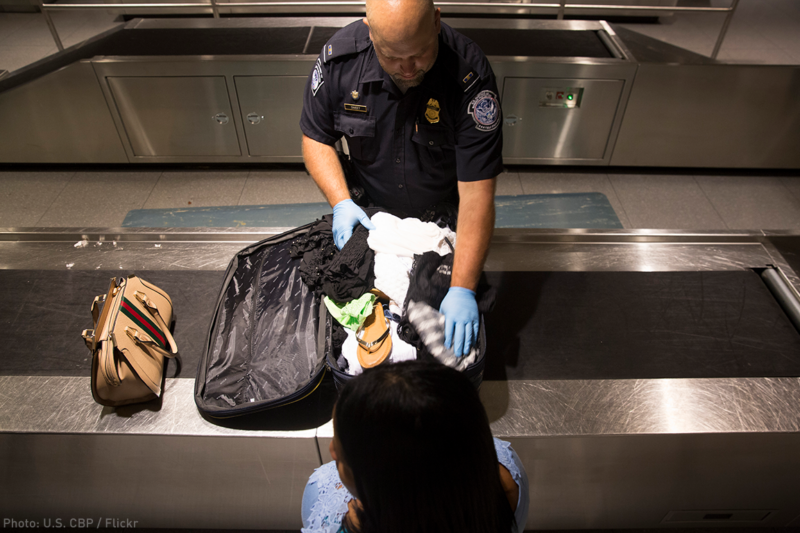
A federal appeals court in Virginia issued an important decision today, ruling that under the Fourth Amendment, U.S. border authorities cannot search travelers’ cell phones and other electronic devices without individualized suspicion of wrongdoing. The court joins a growing chorus of judges who recognize that it is no longer tenable to uncritically find that old rules from pre-digital cases govern highly invasive searches of our digital data.
In the case, United States v. Kolsuz, border agents stopped a traveler as he boarded an international flight at Dulles Airport and found firearm parts in his checked luggage, which they suspected he lacked a license to export. Without obtaining a search warrant, agents seized the traveler’s phone, briefly searched it at the airport, and then sent it to a separate facility where investigators conducted a thorough “forensic” search of all of the data saved on the device. That included all of the traveler’s “personal contact lists, emails, messenger conversations, photographs, videos, calendar, web browsing history, and call logs, along with a history of [his] physical location down to precise GPS coordinates.”
The defendant challenged that forensic search as a violation of his Fourth Amendment rights. In a friend-of-the-court brief and at , the ACLU explained that in light of the tremendous quantity and variety of private data stored on our smart phones and similar devices, the government should have been required to get a search warrant from a judge. At the very least, border agents must demonstrate good reason to believe the traveler was violating the law before conducting the search. We urged the court to reject the government’s argument that cell phones should be treated the same as regular luggage, which border authorities are routinely allowed to search without a warrant or any individualized suspicion.
In its opinion, the Fourth Circuit Court of Appeals largely agreed, writing that the “sheer quantity of data stored on smartphones and other digital devices dwarfs the amount of personal information that can be carried over a border – and thus subjected to a routine [suspicionless] border search – in luggage or a car … The uniquely sensitive nature of that information matters, as well.” Therefore, the court held, “it is clear that a forensic search of a digital phone must be treated as a nonroutine border search, requiring some form of individualized suspicion.”
The court decided that it did not need to reach the question of whether probable cause or a warrant is required (as opposed to reasonable suspicion, a lower legal standard), nor whether the same rule should apply to so-called “manual” searches, in which agents look through the contents of devices themselves without sending them out for forensic searches.
Courts across the country have been struggling with how to apply the Fourth Amendment in this context, in an era when tens of thousands of people are subjected to searches of their electronic devices at the border each year. Today’s ruling from the Fourth Circuit joins an earlier decision from the Court of Appeals requiring at least reasonable suspicion for forensic searches of electronic devices seized at the border. In March, two judges on the concluded that such searches should be treated the same as searches of physical luggage, which don’t require a warrant, while a third judge dissented, arguing for a warrant requirement. Earlier that month, a judge expressed strong skepticism that the traditional rationales for warrantless border searches should be extended to searches of electronic devices, but that court declined to set a rule.
The Fourth Circuit’s decision is a significant step in the right direction, but more clarity is needed. That’s why the ACLU, along with the Electronic Frontier Foundation, has sued the federal government on behalf of 11 people who were subjected to suspicionless searches of their phones and laptops when coming home to the U.S. As we have argued in that case, requiring border agents to get a warrant based on probable cause is the only way to fully ensure that travelers’ Fourth Amendment rights are not violated just because they find themselves at the border. We expect a decision in that case in the coming months. (Update: The day after this article was published, the federal court in this case rejected the government's motion to dismiss the lawsuit. Read about that decision here.)
The patchwork of judicial opinions leaves travelers with different levels of constitutional protection depending on which airports or land crossings they find themselves at. As with other types of highly invasive searches of digital data, this is an issue on which we need consistent — and strong — protections across the nation.


